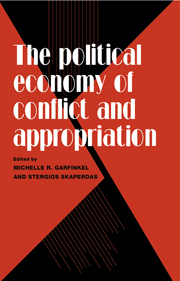Book contents
- Frontmatter
- Contents
- List of contributors
- Acknowledgments
- 1 Introduction: Conflict and appropriation as economic activities
- 2 Anarchy and its breakdown
- 3 Towards a model of territorial expansion and the limits of empire
- 4 Predation and production
- 5 Competitive trade with conflict
- 6 Increasing returns to politics in developing countries with endogenous protection in a fixed-factor model
- 7 Demosclerosis, or special interests “R” us: An information rationale for political gridlock
- 8 Deforestation, investment, and political stability
- 9 Violence and the assignment of property rights on two Brazilian frontiers
- Index
8 - Deforestation, investment, and political stability
Published online by Cambridge University Press: 30 December 2009
- Frontmatter
- Contents
- List of contributors
- Acknowledgments
- 1 Introduction: Conflict and appropriation as economic activities
- 2 Anarchy and its breakdown
- 3 Towards a model of territorial expansion and the limits of empire
- 4 Predation and production
- 5 Competitive trade with conflict
- 6 Increasing returns to politics in developing countries with endogenous protection in a fixed-factor model
- 7 Demosclerosis, or special interests “R” us: An information rationale for political gridlock
- 8 Deforestation, investment, and political stability
- 9 Violence and the assignment of property rights on two Brazilian frontiers
- Index
Summary
Introduction
When governments are volatile or predatory, the individual's incentive to invest is reduced. Instability in the laws and institutions that govern ownership subjects the future return to an investment to confiscation risk - by outright seizure of assets, failure of government to enforce laws of property, or opportunistic taxation. Rule by an elite group rather than by laws can have a similar effect, since the individual's claim to property depends on remaining in favor with the ruling group and on the group's hold on power. Weakened ownership, in turn, dampens the incentive to accumulate and conserve capital of all sorts, including forests, mineral reserves, and ordinary produced capital. In what follows the relationship between insecure ownership and the conservation of forests is examined empirically, using data from two very different sources. The first is historical accounts of the extent of forest cover and patterns of forest use over the last three thousand years, primarily in the Mediterranean basin. The second is a database that allows statistical analysis of the deforestation rates, investment rates, and political attributes of over 100 countries during the 1980s.
Environmental outcomes and patterns of natural resource use vary widely across countries. A quick examination of cross-country environmental data shows that this is true for rates of deforestation, concentrations of air pollutants, availability of sanitation and safe drinking water, and participation in international environmental treaties. Those who study natural resource and environmental problems have devoted little attention to this variation until recently, however, and the recent literature has focused on a single factor, income variation, as a potential cause.
- Type
- Chapter
- Information
- The Political Economy of Conflict and Appropriation , pp. 131 - 156Publisher: Cambridge University PressPrint publication year: 1996
- 1
- Cited by



